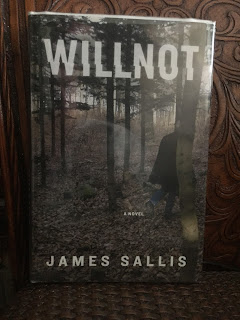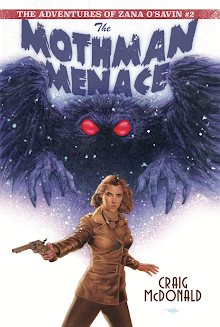If you’ve read my nonfiction
books of author interviews, or followed this blog for any time at all, you know
James Sallis is a writer I revere.
His exceptional Lew Griffin
and John Turner series (the latter including Cypress Grove, Cripple Creek and Salt River,) are personal favorites.
Sallis’ new novel is Willnot (Bloomsbury). It introduces a new protagonist/narrator — a small town
doctor and cult Sci-Fi author’s son named Dr. Lamar Hale.
The novel opens with the
discovery of a mass grave in Willnot, a place locked in a different era in the
sense it lacks chain or big box stores, churches or other common touchstones defining small town life in this uncertain century.
It's haunting opening—a dog
turning up all those bodies—is a rock thrown into the quiet, quirky pond that’s
Willnot. The rest of the novel is an exploration of the resulting ripples,
moving out in widening circles, touching past and present and sometimes
blurring those distinctions.
If you come to this book
expecting a straight up mystery or crime novel, you need to temper your
expectations and open your mind to a broader and far more compelling experience. There are
mysteries to be solved here and connections to be made, but it is very much upon
the reader to do much of that detective work: you’re not going to be spoon-fed
clues as in some damn cozy.
A favorite Sallis quote
speaks to this: “Literature is not some imposing sideboard
with discrete drawers labeled poetry, mystery, serious novel, science fiction —
but a long buffet table laid out with all manner of fine, diverse foods.”
Willnot is not a Griffin novel, or another Drive,
but rather a James Sallis novel closer in spirit perhaps to his haunting Renderings.
It’s a mix of genres that defies easy categorization beyond simply stating that
at this point, it may be fair and best to say James Sallis is a genre
unto himself.
The Griffin series is a
tightly interwoven tapestry of “novels about a detective” that can be read
discretely, but together call backward and forward to one another, speaking to
one another and in doing so telling a larger, richer and far more engrossing
story.
A passage or phrase in one Griffin
novel may recur in a later installment, encouraging connections and deeper
contemplation. An echo in a later installment can re-contextualize something
occurring in an earlier book.
Willnot has a similar
effect: Images and phrases recur throughout and accumulate.
As a child our narrator fell
into an inexplicable coma endowing him with a brand of hyper-empathy and keening
identification with others.
In a playful, mocking
observation, Hales cites what he regards a perhaps overused assertion by Soren
Kierkegaard: “Life can only be understood backwards; but it must be lived
forwards.” Sallis might wryly add, because “Life rarely gets the detour signs
up in time.”
The attentive reader has the
sense Doc Hale’s living in both the past and the present, in a sense. And maybe the
future, too.
(In a playful passage in
this book haunted by the looming spirit of an off-camera science fiction and
fantasy novelist, we get this wonderful aside spotted on a bumper sticker:
“TECHNICALLY, THERE WOULD ONLY NEED TO BE ONE TIME TRAVELER’S CONVENTION”.)
Appropriately, in Willnot,
the walls between past, present and the future are in a subtle state of uncertainty.
The novel is appropriately full of aft- and
foreshadowing. In that sense, Willnot is a Möbius strip of mysteries twining
into other mysteries and revelations.
I’d argue when an author composes
novels with this level of attention to detail, focus and singular intent, it’s
incumbent upon the conscientious and engaged reader make a first pass study in
a concentrated and focused single-sitting read. To do less is to risk missing too
much.
I made the error of picking
up this Sallis novel at eight o-clock on a Friday night. I finished at one on
Saturday morning, head swimming. (And, my God, the dreams…?)
Critic and fellow crime novelist
Woody Haut’s declared Willnot to perhaps be Sallis “saddest novel.”
I wouldn’t quibble with that,
but I’d add it’s also one of Sallis’ richest novels, and a story that
demands further visits I suspect will result in deeper revelation.







































